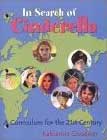
Cinderella:
345 Variants
by Marian
Roalfe Cox
SurLaLune's
Cinderella Area
SurLaLune Fairy Tales Main Page
276
Bondeson, August, Historiegubbar pa Dal. Stockholm, 1886. P. 22.
"PRINSASSAN I JORDKULAN"
(The Princess in the Cave).
ABSTRACT
Heroine may not wed prince; king shuts her up in cave with seven maidens, a dog, and victuals for seven years. She digs way out; rides on bear to charcoal-burners--Menial heroine (poultry-girl at castle)--Bride sends heroine to church in her stead; cannot afterwards repeat words said on the way, or show gold chain which prince has locked round heroine's neck-- Recognition--Happy marriage.
TABULATION
(1) King has daughter whom a prince woos. King, not liking prince, has cave dug in forest, and encloses heroine in it, giving her seven maidens and a little dog, also victuals, candles, and firewood to last seven years.-- (2) By the end of that time, the seven maidens having died and the provisions being spent, heroine begins digging way out. When hole is made she puts little dog through, and it scrapes from the outside, while heroine works from inside, till opening is large enough for her to squeeze through.-- (3) A bear meets her and offers to carry her to fellow-Creatures, if allowed to eat dog.-- (4) Heroine reluctantly accepts conditions, and bear carries her to charcoal-burner, through whom she obtains situation as poultry-girl at castle.-- (5) King is about to marry, and bride persuades heroine to take her place on wedding-day, being about to bear a child.1 As they ride to church heroine's horse strikes his shoe against a stone. She says:
"While the horse's shoe clinks in the valley this morn,
At home in the stable the bride's son is born."
King asks what she said, and she replies, "I was only talking to my maid." Presently they pass a large ship belonging to heroine's father, which will not stir unless called by name. Heroine says:
"Big Bomarusa, here you stay!
Wave-tost you've sailed full many a day
From my dear father's home away."
Immediately the ship begins to move, splitting the waves before her. King again asks what she said, and has same reply. Then they pass a bridge, and king tells her it will never remain stationary for a wedding-party to cross it, unless both bride and bridegroom are of royal blood. Heroine says:
"Stand firmly, bridge, and firmly bide,
While two royal children o'er thee ride."
They reach the church before clergyman, and king asks heroine to tell him something whilst waiting. She says:
"Seven years in the underground cave have I passed,
All my ballads and stories forgetting at last.
Of the things that befell me
Many tales could I tell thee:
How I suffered great care,
How I rode on a bear,
How I lived charcoal-burning
My daily bread earning.
Bet as bride
Now I ride!
And a prince I shall wed
In a fair lady's stead."
King, thinking her exceedingly beautiful, locks a gold chain round her neck, keeping the key himself.-- (6) They return home, and bride changes places with heroine, and sits at king's side. She looks pale and exhausted, and king, being suspicious, inquires what things she said on way to church. She does not remember, and must go each time to ask her maid. At length king asks for the gold chain. "My maid has it." "You lie!" says the king; "no one can unlock it." He commands all the women in the castle to appear; all come, except the poultry King is sure there must be somebody left, and bride says there is only the dirty poultry-girl.-- (7) She is fetched, and the king instantly recognises her as the bride, to whom he is married. He is the prince, her former wooer.
NOTES
Note 14
(P. 174.) For the same reason Isota the Black makes Isol take her place in the Icelandic variant, "Tistram, and Isol the Bright" (Arnason, p. 251); such is the case also in Nos. 283, 289, 290, 291. In the remaining stories of this type the bride has various motives for not attending the marriage ceremony: in No. 284 he is afraid to ride a restive horse; in No. 292 the wedding-dress does not fit her; in Nos. 293 and 303 she is in love with someone else; in No. 294 she is shy of her ugliness; in No. 299 the bride is a sorceress, therefore cannot enter a church; and in No. 302 she is ill.
See note 31.
Return to place in text.
Cox, Marian Roalfe. Cinderella: Three Hundred and Forty-five Variants of Cinderella, Catskin, and Cap O' Rushes, abstracted and tabulated. London: David Nutt for the Folklore Society, 1893.
While the original text of this book is out of copyright, the special formatting and compilation available on SurLaLune Fairy Tales is copyrighted. Be aware that while the original content has been honored, page numbering, footnote numbering, redesigned charts, links, and other aspects are unique to this site's version of the text. Use at your own risk. For private and fair use educational purposes only.
©Heidi
Anne Heiner, SurLaLune Fairy Tales
E-mail: surlalune@aol.com
Page last updated February 1, 2006
www.surlalunefairytales.com










